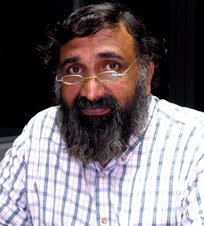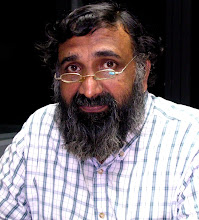ഇക്കഴിഞ്ഞ സെപ്റ്റംബര് 10-12 തീയതികളില് കോഴിക്കോട്ടുള്ള നാഷണല് ഇന്സ്റ്റിറ്റ്യൂട്ട് ഓഫ് ടെക്നോളജിയില് വെച്ചു് സ്വതന്ത്ര സോഫ്റ്റ്വെയറും വിദ്യാഭ്യാസവും എന്ന വിഷയത്തെപ്പറ്റി ഒരു സമ്മേളനം നടന്നു. അതു് സംഘടിപ്പിക്കുന്നതില് ഈ ലേഖകനു് ഒരു പ്രധാന പങ്കുണ്ടായിരുന്നു. 10-ാം തീയതി വൈകിട്ടു് സ്വതന്ത്ര സോഫ്റ്റ്വെയര് പ്രസ്ഥാനത്തിന്റെ സ്ഥാപക നേതാവായ റിച്ചാര്ഡ് സ്റ്റാള്മാന്റെ മുഖ്യപ്രഭാഷണത്തോടെ ആരംഭിച്ച സമ്മേളനം സ്ഥലത്തെ നിയമസഭാംഗമായ ശ്രീ പ്രദീപ് കുമാറാണു് ഉത്ഘാടനം ചെയ്തതു്. ഈ സമ്മേളനത്തിന്റെ പശ്ചാത്തലത്തില് അവിടെ ചര്ച്ചചെയ്ത വിഷയത്തെപ്പറ്റി ഒരു വിലയിരുത്തല് നടത്താം.
കേരളത്തിലുള്ളവരെ സ്വതന്ത്ര സോഫ്റ്റ്വെയര് പരിചയപ്പെടുത്തേണ്ട ആവശ്യമുണ്ടെന്നു തോന്നുന്നില്ല. നമ്മുടെ പള്ളിക്കൂടങ്ങളിലെല്ലാം ഉപയോഗിക്കുന്നതു് സ്വതന്ത്ര സോഫ്റ്റ്വെയറാണല്ലോ. എങ്കിലും എന്താണു് സ്വതന്ത്ര സോഫ്റ്റ്വെയര് എന്നു് വിശദീകരിക്കട്ടെ. കമ്പോളത്തില് വിറ്റഴിക്കുന്ന സോഫ്റ്റ്വെയറുകള് ഉപയോക്താക്കള്ക്കു് സ്വാതന്ത്ര്യം നല്കുന്നവയല്ല. ഒരു നിശ്ചിത എണ്ണം കമ്പ്യൂട്ടറുകളില് ഉപയോഗിക്കാനുള്ള അവകാശം മാത്രമാണു് അവയുണ്ടാക്കുന്ന കമ്പനികള് ഉപയോക്താക്കള്ക്കു് നല്കുന്നതു്. മാത്രമല്ല, മനുഷ്യര്ക്കു് പഠിക്കാനാകുന്ന സോഫ്റ്റ്വെയറിന്റെ മൂലരൂപമായ സോഴ്സ് കോഡ് അവര് പരമരഹസ്യമാക്കി വച്ചിരിക്കുകയാണു്. അതുകൊണ്ടു തന്നെ സോഫ്റ്റ്വെയറില് എന്തെങ്കിലും മാറ്റം വരുത്തണമെന്നു് ഒരു ഉപയോക്താവിനു് തോന്നിയാലും അതു് ചെയ്യാനാവില്ല. എത്ര കമ്പ്യൂട്ടറുകളില് വേണമെങ്കിലും ഏതാവശ്യത്തിനും ഉപയോഗിക്കാനും മറ്റുള്ളവര്ക്കു് പകര്ന്നു കൊടുക്കാനും മൂലരൂപം വായിച്ചു് പഠിക്കാനും അതില് മാറ്റം വരുത്താനും എല്ലാം സ്വാതന്ത്ര്യം നല്കുന്ന സോഫ്റ്റ്വെയറാണു് സ്വതന്ത്ര സോഫ്റ്റ്വെയര്. 1983 സെപ്റ്റംബറില് റിച്ചാര്ഡ് സ്റ്റാള്മാനാണു് ഇതിനു് തുടക്കം കുറിച്ചതു്.
വിവരവിനിമയ സാങ്കേതികവിദ്യ, അഥവാ ഐ.സി.റ്റി (Information Communication Technology, ICT) എന്നതു് മനുഷ്യന് വികസിപ്പിച്ചെടുത്തിട്ടുള്ള സാങ്കേതിക വിദ്യകളില്വച്ചു് ഏറ്റവും കൂടുതല് സാദ്ധ്യതകളുള്ളതും നമ്മുടെ ജീവിതത്തെ സ്വാധീനിക്കാന് ഏറ്റവും കഴിവുള്ളതും ആയവയില് ഒന്നാണെന്നു പറയാം. നമ്മള് കാര്യങ്ങള് ചെയ്യുന്നതിനെയും ചിന്തിക്കുന്നതിനെ പോലും വല്ലാതെ സ്വാധീനിക്കാന് ഈ സാങ്കേതികവിദ്യയ്ക്കു് കഴിഞ്ഞിരിക്കുന്നു. സന്ദേശങ്ങള് കൈമാറുന്നതു മുതല് അച്ചടി, ഛായാഗ്രഹണം, സംഗീതരചന, ചലച്ചിത്രനിര്മ്മാണം എന്നിങ്ങനെ നമ്മുടെ മിക്ക കര്മ്മരംഗങ്ങളെയും കമ്പ്യൂട്ടര് മാറ്റിമറിച്ചിരിക്കുന്നു. ഉദാഹരണമായി, കടകളുടെ മുന്നില് വയ്ക്കുന്ന ചെറിയ ബോര്ഡുകള് മുതല് വലിയ പരസ്യബോര്ഡുകള് വരെ ഒന്നും ആരും ഇപ്പോള് കൈകൊണ്ടു് എഴുതാറില്ല. സെല്ഫോണ് മുതല് വാഷിങ്ങ് മഷീന് വരെ പല ഉപകരണങ്ങളിലും ഇന്നു് കമ്പ്യൂട്ടറിന്റെ ചെറിയ രൂപം കാണാനാവും. ഇത്രയധികം സാദ്ധ്യതകളുള്ള ഒരു സാങ്കേതികവിദ്യ വിദ്യാഭ്യാസത്തിലും സ്വാധീനം ചെലുത്താതിരുന്നാലേ അത്ഭുതമുള്ളൂ.
വിദ്യാഭ്യാസത്തില് ഐസിറ്റിയ്ക്കു് വ്യത്യസ്തമായ രണ്ടു് പങ്കുകളുണ്ടു്. ഒന്നു്, കമ്പ്യൂട്ടറിനെയും ഇന്റര്നെറ്റിനെയും കുറിച്ചു് പഠിപ്പിക്കുന്നതിലാണു്. രണ്ടു്, എല്ലാ വിഷയങ്ങളും പഠിപ്പിക്കുകയും പഠിക്കുകയും ചെയ്യുന്നതു് എളുപ്പമാക്കാനാണു്. ആദ്യത്തേതിനെ ഐസിറ്റി വിദ്യാഭ്യാസമെന്നും (ICT education) രണ്ടാമത്തേതിനെ ഐസിറ്റി സഹായത്തോടെയുള്ള വിദ്യാഭ്യാസമെന്നും (ICT enabled education) വിളിക്കാം. ഐസിറ്റി വിദ്യാഭ്യാസത്തില് രണ്ടു ഭാഗങ്ങളുണ്ടു് --- ഹാര്ഡ്വെയറും സോഫ്റ്റ്വെയറും. ഹാര്ഡ്വെയറിന്റെ ഉത്പാദനത്തിനു് സങ്കീര്ണ്ണമായ സാങ്കേതികവിദ്യ ആവശ്യമാണു്. അതിനു് സങ്കീര്ണ്ണമായ ഉപകരണങ്ങളും ആവശ്യമാണു്. അതുകൊണ്ടുതന്നെ അതു് ചില രാജ്യങ്ങള്ക്കു മാത്രമെ സാധ്യമായിട്ടുള്ളൂ. എന്നാല് സോഫ്റ്റ്വെയറിന്റെ കാര്യം അങ്ങനെയല്ല. അവിടെ ഏറ്റവും ആവശ്യമായതു് അറിവാണു്. ഒരു കമ്പ്യൂട്ടറും പ്രോഗ്രാമിങ്ങിലുള്ള അറിവും ഉണ്ടെങ്കില് ആര്ക്കും സോഫ്റ്റ്വെയര് സൃഷ്ടിക്കാം. കമ്പ്യൂട്ടറിനു് വില കുറഞ്ഞുവരുന്ന ഈ കാലഘട്ടത്തില് ഇതൊരു വലിയ കടമ്പയല്ല. ഐസിറ്റി വിദ്യാഭ്യാസത്തിന്റെ ഒരു പ്രധാന ഭാഗം അതുകൊണ്ടു് ആര്ക്കും സാധ്യമായതാണു്.
നമ്മള് വിദ്യാര്ത്ഥികളെ കമ്പ്യൂട്ടര് സോഫ്റ്റ്വെയര് നിര്മ്മിക്കാന് എങ്ങനെയാണു് പ്രാപ്തരാക്കേണ്ടതു്? ഇപ്പോള് തുടര്ന്നുപോകുന്ന രീതി അവരെ പ്രോഗ്രാമിങ്ങ് ഭാഷകള് പഠിപ്പിക്കുക എന്നുള്ളതാണു്. C, C++. Java തുടങ്ങി പല ഭാഷകള് പ്രചാരത്തിലുണ്ടു്. ചെറിയ കുട്ടികളെ മലയാള അക്ഷരങ്ങളും വാക്കുകളും മറ്റും പഠിപ്പിക്കുന്നതുപോലെ വിദ്യാര്ത്ഥികളെ ഈ ഭാഷകളിലെ പദങ്ങളും അവയുടെ വ്യാകരണവും പഠിപ്പിക്കുക എന്നതാണു് ഇപ്പോള് ചെയ്തുവരുന്നതു്. എന്നാല് അതുകൊണ്ടു് ഭാഷാപഠനം ആയോ എന്നു് നമ്മള് ചിന്തിക്കേണ്ടതാണു്. ഏതു് ഭാഷയിലും ഉപരിപഠനത്തിനു് തയാറാകുന്ന വിദ്യാര്ത്ഥികള് ആ ഭാഷയിലെ സാഹിത്യവും പഠിക്കുന്നുണ്ടു്. ഭാഷ ഉപയോഗിക്കുന്നതില് അതിസമര്ത്ഥരായവര് എങ്ങനെയാണു് എഴുതുന്നതു് എന്നു് നേരിട്ടനുഭവിച്ചറിയാനാണല്ലോ സാഹിത്യം പഠിക്കുന്നതു്. അതുപോലെ, സിനിമ പഠിക്കുന്നവര് പ്രഗത്ഭരായ സംവിധായകരുടെയും മറ്റും ചലച്ചിത്രങ്ങളെ പാഠപുസ്തകങ്ങള് എന്നവണ്ണം പഠിക്കുന്നു. ഐസന്സ്റ്റൈനും ഗൊദാര്ദും റേയും ഘട്ടക്കും ഒക്കെ അവര്ക്കു് പാഠങ്ങളാണു്. അപ്പോള് പ്രോഗ്രാമിങ്ങ് ഭാഷ പഠിക്കുമ്പോഴും അതില് പ്രഗത്ഭരായവരുടെ കൃതികള് പഠിക്കേണ്ടതല്ലേ?
ഇതു് സാദ്ധ്യമാകുന്നതു് സ്വതന്ത്ര സോഫ്റ്റ്വെയറിന്റെ ലോകത്തു് മാത്രമെയുള്ളൂ എന്നു് വ്യക്തമാണല്ലോ. കാരണം കമ്പനികള് നിര്മ്മിച്ചു വിലയ്ക്കു് വില്ക്കുന്ന സോഫ്റ്റ്വെയറിന്റെ മൂലരൂപം അവര് ഒളിച്ചു വച്ചിരിക്കുകയാണു്. അതു് മറ്റാര്ക്കും കാണാനാവില്ല. ആ നിലയ്ക്കു് എത്ര പ്രഗത്ഭരായ പ്രോഗ്രാമര്മാര് കച്ചവട സോഫ്റ്റ്വെയര് രചിച്ചിട്ടുണ്ടെങ്കിലും അതിന്റെ മൂലരൂപം കണ്ടു പഠിക്കാന് വളര്ന്നുവരുന്ന പ്രോഗ്രാമര്മാര്ക്കാവില്ല. അതുകൊണ്ടുതന്നെ വിദ്യാഭ്യാസത്തില് സ്വതന്ത്രസോഫ്റ്റ്വെയര് ഉപയോഗിക്കേണ്ടതു് അത്യാവശ്യമാണു്. എന്നാല് അതിനു് മറ്റു കാരണങ്ങളുമുണ്ടു്. ഗ്നു ലിനക്സ് പോലെയുള്ള ഒരു സ്വതന്ത്ര ഓപ്പറേറ്റിങ്ങ് സിസ്റ്റത്തിന്റെയും ഫയര്ഫോക്സ് പോലെയുള്ള വെബ് ബ്രൌസറിന്റെയും പ്രവര്ത്തനരീതിയും വിശദാംശങ്ങളും ആര്ക്കും പഠിക്കാവുന്നതാണു്. ഒരു കാറിന്റെ പ്രവര്ത്തനം മനസിലാക്കാന് അതിന്റെ ഭാഗങ്ങള് വേര്പെടുത്തിയെടുത്തു് പഠിക്കുന്നതുപോലെ ഇത്തരം ഒരു സോഫ്റ്റ്വെയറിന്റെ പ്രവര്ത്തനം പഠിക്കാന് അതിന്റെ ഭാഗങ്ങള് വേര്പെടുത്തിയെടുത്തു് പഠിക്കുന്നതു് നല്ലതാണു്. ഇതും സാദ്ധ്യമാകുന്നതു് സ്വതന്ത്ര സോഫ്റ്റ്വെയറില് മാത്രമാണു്.
ഇനി പല ആവശ്യങ്ങള്ക്കായി കമ്പ്യൂട്ടര് ഉപയോഗിക്കാന് പഠിപ്പിക്കുമ്പോഴും സ്വതന്ത്ര സോഫ്റ്റ്വെയര് തന്നെയാണു് ഉത്തമം. കാരണം വിദ്യാഭ്യാസ സ്ഥാപനത്തില് ഉപയോഗിക്കുന്ന അതേ സോഫ്റ്റ്വെയര് സ്വന്തമായി കമ്പ്യൂട്ടറുള്ള വിദ്യാര്ത്ഥിക്കും ഉപയോഗിക്കുന്നതിനു് പ്രയാസമില്ല എന്നുള്ളതാണു്. കോളജില് ഉപയോഗിക്കുന്നതു് വിലകൊടുത്തു വാങ്ങേണ്ട സോഫ്റ്റ്വെയറാണെങ്കില് പല വിദ്യാര്ത്ഥികള്ക്കും അതു് വാങ്ങാനുള്ള സാമ്പത്തികശേഷി ഉണ്ടാവണമെന്നില്ല. ഇത്തരം സോഫ്റ്റ്വെയറുകള്ക്കു് വലിയ വിലയുമാണു്. അപ്പോള് നിയമം ലംഘിക്കുകയല്ലേ അവര്ക്കു് നിവൃത്തിയുള്ളൂ? മാത്രമല്ല, അതു് ഉള്ളവരെന്നും ഇല്ലാത്തവരെന്നും വിദ്യാര്ത്ഥികളെ വേര്തിരിക്കുന്നു.
ഇന്ത്യയിലും മറ്റു പല രാജ്യങ്ങളിലും വിദ്യാഭ്യാസരംഗത്തു് സ്വതന്ത്ര സോഫ്റ്റ്വെയര് ഉപയോഗിക്കാനായി പല പദ്ധതികളും നടപ്പിലാക്കുന്നുണ്ടു്. ഐസിറ്റി ഉപയോഗിച്ചു് വിദ്യാഭ്യാസം നടത്താനുള്ള ദേശീയ പദ്ധതി (National Mission on Education through ICT, NMEICT), FOSSEE (Free and Open Source Software in Science and Engineering Education) എന്നീ പദ്ധതികളെപ്പറ്റിയും ഇന്ദിരാഗാന്ധി നാഷണല് ഓപ്പണ് യൂണിവേഴ്സിറ്റിയുടെ ഇന്റര്നെറ്റിലൂടെയുള്ള തുറന്ന വിദ്യാഭ്യാസ പദ്ധതിയെപ്പറ്റിയും ഇറ്റലിയിലെ സോളിടെക് എന്ന പരിപാടിയെപ്പറ്റിയും മറ്റും അവയുമായി ബന്ധപ്പെട്ടവര് സമ്മേളനത്തില് സംസാരിച്ചു. ബോംബെയിലെ എസ്.എന്.ഡി.റ്റി. വനിതാ സര്വ്വകലാശാല എങ്ങനെ പൂര്ണ്ണമായി സ്വതന്ത്ര സോഫ്റ്റ്വെയറിലേക്കു് മാറി എന്ന കഥ അതു് നടപ്പിലാക്കിയവര് അവിടെ അവതരിപ്പിച്ചു. കൂടാതെ, എല്ലാ വിദ്യാഭ്യാസ സ്ഥാപനങ്ങളും സ്വതന്ത്ര സോഫ്റ്റ്വെയര് മാത്രം ഉപയോഗിക്കാനുള്ള ആഹ്വാനം സമ്മേളനം പ്രഖ്യാപനമായി സ്വീകരിക്കുകയും ചെയ്തു. ഈ പ്രഖ്യാപനം http://wiki.hipatia.net/index.php/DeclarationEduconf2010 എന്ന വെബ്സൈറ്റില് ലഭ്യമാണു്. അതില് പറയുന്ന ആശയങ്ങളോടു് യോജിക്കുന്നവര് പ്രഖ്യാപനത്തില് തങ്ങളുടെ പേരുകൂടി എഴുതി ചേര്ക്കണമെന്നു് അഭ്യര്ത്ഥിക്കുന്നു.
നമ്മുടെ വിദ്യാഭ്യാസ നിലവാരം മെച്ചപ്പെടണമെങ്കില് അതു് മാര്ക്കു വാങ്ങാനും ഡിഗ്രി സമ്പാദിക്കാനും മാത്രമുള്ളതാകരുതു്. വിദ്യാഭ്യാസം അറിവു് നേടാനാകണം. വ്യക്തിത്വ വികാസത്തിനാകണം. പരസ്പര സഹകരണത്തോടെയും പരസ്പര ബഹുമാനത്തോടെയും കൂടി സമൂഹത്തില് ജീവിക്കാന് പഠിക്കാനാകണം. ഇങ്ങനെയൊക്കെ ആകാനായി സഹായിക്കുന്നതാണു് സ്വതന്ത്ര സോഫ്റ്റ്വെയര്. അതു് ഡിജിറ്റല് വിടവു് നികത്താന് സഹായിക്കുന്നതാണു്. പരസ്പര സഹകരണത്തിലൂടെ വളരുന്നതാണു്. അതുകൊണ്ടുതന്നെ വിദ്യാഭ്യാസത്തില് സ്വതന്ത്ര സോഫ്റ്റ്വെയര് മാത്രം ഉപയോഗിക്കേണ്ടതാണു്.









